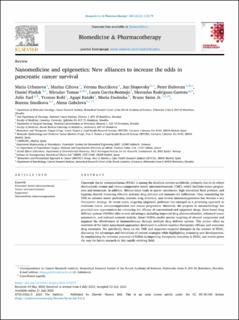| dc.contributor.author | Urbanova, Maria | |
| dc.contributor.author | Cihova, Marina | |
| dc.contributor.author | Buocikova, Verona | |
| dc.contributor.author | Slopovsky, Jan | |
| dc.contributor.author | Dubovan, Peter | |
| dc.contributor.author | Pindak, Daniel | |
| dc.contributor.author | Tomas, Miroslav | |
| dc.contributor.author | García-Bermejo, Laura | |
| dc.contributor.author | Rodríguez-Garrote, Mercedes | |
| dc.contributor.author | Earl, Julie | |
| dc.contributor.author | Kohl, Yvonne | |
| dc.contributor.author | Kataki, Agapi | |
| dc.contributor.author | Dusinska, Maria | |
| dc.contributor.author | Sainz Jr., Bruno | |
| dc.contributor.author | Smolkova, Bozena | |
| dc.contributor.author | Gabelova, Alena | |
| dc.date.accessioned | 2023-08-14T09:14:08Z | |
| dc.date.available | 2023-08-14T09:14:08Z | |
| dc.date.created | 2023-08-09T16:26:24Z | |
| dc.date.issued | 2023 | |
| dc.identifier.citation | Biomedicine & Pharmacotherapy. 2023, 165, 115179. | en_US |
| dc.identifier.issn | 0753-3322 | |
| dc.identifier.uri | https://hdl.handle.net/11250/3083731 | |
| dc.description.abstract | Pancreatic ductal adenocarcinoma (PDAC) is among the deadliest cancers worldwide, primarily due to its robust desmoplastic stroma and immunosuppressive tumor microenvironment (TME), which facilitate tumor progression and metastasis. In addition, fibrous tissue leads to sparse vasculature, high interstitial fluid pressure, and hypoxia, thereby hindering effective systemic drug delivery and immune cell infiltration. Thus, remodeling the TME to enhance tumor perfusion, increase drug retention, and reverse immunosuppression has become a key therapeutic strategy. In recent years, targeting epigenetic pathways has emerged as a promising approach to overcome tumor immunosuppression and cancer progression. Moreover, the progress in nanotechnology has provided new opportunities for enhancing the efficacy of conventional and epigenetic drugs. Nano-based drug delivery systems (NDDSs) offer several advantages, including improved drug pharmacokinetics, enhanced tumor penetration, and reduced systemic toxicity. Smart NDDSs enable precise targeting of stromal components and augment the effectiveness of immunotherapy through multiple drug delivery options. This review offers an overview of the latest nano-based approaches developed to achieve superior therapeutic efficacy and overcome drug resistance. We specifically focus on the TME and epigenetic-targeted therapies in the context of PDAC, discussing the advantages and limitations of current strategies while highlighting promising new developments. By emphasizing the immense potential of NDDSs in improving therapeutic outcomes in PDAC, our review paves the way for future research in this rapidly evolving field. | en_US |
| dc.language.iso | eng | en_US |
| dc.rights | Attribution-NonCommercial-NoDerivatives 4.0 Internasjonal | * |
| dc.rights.uri | http://creativecommons.org/licenses/by-nc-nd/4.0/deed.no | * |
| dc.title | Nanomedicine and epigenetics: New alliances to increase the odds in pancreatic cancer survival | en_US |
| dc.title.alternative | Nanomedicine and epigenetics: New alliances to increase the odds in pancreatic cancer survival | en_US |
| dc.type | Peer reviewed | en_US |
| dc.type | Journal article | en_US |
| dc.description.version | publishedVersion | en_US |
| dc.rights.holder | © 2023 The Authors. Published by Elsevier Masson SAS. | en_US |
| dc.source.volume | 165 | en_US |
| dc.source.journal | Biomedicine & Pharmacotherapy | en_US |
| dc.identifier.doi | 10.1016/j.biopha.2023.115179 | |
| dc.identifier.cristin | 2165972 | |
| dc.relation.project | NILU - Norsk institutt for luftforskning: 119125 | en_US |
| dc.relation.project | EC/H2020/857381 | en_US |
| dc.source.articlenumber | 115179 | en_US |
| cristin.ispublished | true | |
| cristin.fulltext | original | |
| cristin.qualitycode | 1 | |

